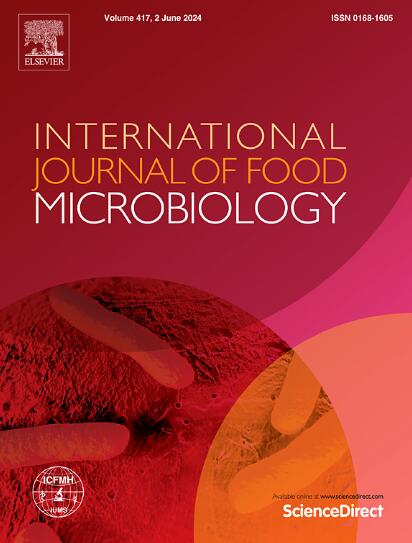Adaptive strategies of Listeria monocytogenes: An in-depth analysis of the virulent strain involved in an outbreak in Italy through quantitative proteomics
IF 5
1区 农林科学
Q1 FOOD SCIENCE & TECHNOLOGY
International journal of food microbiology
Pub Date : 2024-10-28
DOI:10.1016/j.ijfoodmicro.2024.110951
引用次数: 0
Abstract
Despite the general classification of L. monocytogenes strains as equally virulent by global safety authorities, molecular epidemiology reveals diverse subtypes in food, processing environments, and clinical cases. This study focuses on a highly virulent strain associated with a listeriosis outbreak in Italy in 2022, providing insights through comprehensive foodomics approaches, with a specific emphasis on quantitative proteomics. In particular, the ST155 strain of L. monocytogenes strain was subjected in vitro to growth stress conditions (NaCl 2.4 %, pH 6.2, T 12 °C), mimicking the conditions present in the frankfurter, its original source. Then, the protein expression patterns were compared with those obtained in optimal growth conditions.
Through quantitative proteomic analysis and bioinformatic assessment, different proteins associated with virulence during the exponential growth phase were identified. This study unveils unique proteins specific to each environment, providing insights into how L. monocytogenes adapts to conditions that are similar to those encountered in frankfurters. This investigation contributes valuable insights into the adaptive strategies of L. monocytogenes under stressful conditions, with implications for enhancing food safety practices.
单核细胞增生李斯特菌的适应策略:通过定量蛋白质组学深入分析意大利疫情中的毒株
尽管全球安全机构一般将单核细胞增生症菌株划分为毒性相同的菌株,但分子流行病学揭示了食品、加工环境和临床病例中的不同亚型。本研究的重点是与 2022 年意大利爆发的李斯特菌病有关的高毒力菌株,通过全面的食品组学方法提供见解,特别强调定量蛋白质组学。特别是,对 ST155 株单核细胞增多症菌株进行了体外生长应激条件试验(NaCl 2.4 %、pH 6.2、T 12 °C),模拟其原始来源法兰克福香肠中的生长条件。通过定量蛋白质组分析和生物信息学评估,确定了在指数生长阶段与毒力相关的不同蛋白质。这项研究揭示了每种环境中特有的蛋白质,为了解单核细胞增多性乳酸杆菌如何适应与法兰克福香肠中类似的条件提供了见解。这项调查有助于深入了解单核细胞增生葡京手机投注平台在压力条件下的适应策略,对加强食品安全实践具有重要意义。
本文章由计算机程序翻译,如有差异,请以英文原文为准。
求助全文
约1分钟内获得全文
求助全文
来源期刊
CiteScore
10.40
自引率
5.60%
发文量
322
审稿时长
65 days
期刊介绍:
The International Journal of Food Microbiology publishes papers dealing with all aspects of food microbiology. Articles must present information that is novel, has high impact and interest, and is of high scientific quality. They should provide scientific or technological advancement in the specific field of interest of the journal and enhance its strong international reputation. Preliminary or confirmatory results as well as contributions not strictly related to food microbiology will not be considered for publication.

 求助内容:
求助内容: 应助结果提醒方式:
应助结果提醒方式:


